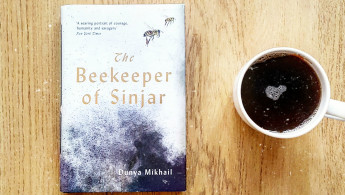The Beekeeper of Sinjar: A powerful tale of humanity
"Their souls haven't moved on, they never will. That's why their bodies hurt so much. Staying alive doesn't mean permanent survival. Anyway, what is survival when the calamity survives along with you? To survive all alone is the worst kind of survival."
Until 2014, Abdullah Shrem worked as a beekeeper in Sinjar, Iraq, selling honey. When the Islamic State group [ISIS/IS] move in to his territory, his response is quite phenomenal. He creates a network of rescuers, both male and female, to help the women who have been captured; they work as transporters as well to ensure the women's safety. He saves individual people, both men and women, children and families. He acts almost like the Queen Bee himself: the heart and soul of his work is to bring these women back to where they rightfully belong.
The book itself is a piece of non-fiction detailing accounts of numerous women who were captured by IS and who he helped to escape. It is written by Dunya Mikhail, an Iraqi-Assyrian poet who is now based in the United States but was born in Iraq. She previously worked as a journalist for The Baghdad Observer before she had to flee Iraq via Jordan. Her own journey as well as the beekeeper's himself, is included in this book.
Sinjar is a town in the Nineveh province of Iraq, close to Mount Shingal. Those not familiar with the area soon learned of it when stories emerged of al-Qaeda causing several explosions in 2007 resulting in the death of hundreds of Yazidis, the people who lived there. Seven years later, Daesh, also known as IS, seized the town.
From the very first page, the writing is hard-hitting and utterly heart-breaking. There are no other words to describe how I felt whilst reading this book. I could not believe I was reading events that actually happened, when IS stormed into Iraq and captured Yazidi people.
I could not believe it was real life, that families were forced to flee their homes and take shelter on a mountain in Sinjar. So many of the families left with nothing else but the clothes on their back; some did not even take necessities for their children, such as nappies, water or food. They walked for miles; some found a camp. Their remarkable courage has flown into my veins and remains there, reminding me of their trauma.
Every woman's story is unique to herself, yet each shares similarities with the other. When IS infiltrated Iraq, they separated men from women, giving assurances that everything would be okay and this was a somewhat temporary measure. These women watched their men, grandparents and own children buried alive. Some boys were recruited for training, which included learning how to kill and how to chop off people's heads.
Abdullah recounts the first time he saved a girl in 2014, when he received a call from Marwa, who had been kidnapped. He tells her she needs to get out. Six days later she contacts him again and explains she is safe in the home of a Syrian family. Marwa had a guard who was part of IS. She would bite her, beat her and prevented her from doing anything, including dying.
Marwa came back alone without any members of her family. Abdullah then tells the reader he has fifty-six members of his own family who are still missing. This includes his own brother and sister.
The women captured were sold at a market to other IS men. They kept the women and children in the same clothes for the entire duration of their captivity. This could be up to a whole year. They "married" girls as a little as nine years old.
Some tried to run away but were caught and punished. Others memorised Abdullah's number after being given it by other women detained in a building before they were all sold.
 |
It needs to be read. It should be read... It is essential reading of the highest kind |  |
Zuhour has three children; two girls and a baby boy. Luckily, the father travels for weeks at a time so Zuhour could stay freely when he was not around but when he returned home she hid with her children in a sewing room. After staying with her for two and a half months, Zuhour eventually leaves but not after her sadness and despair is conveyed to the reader.
What is also incredible in this story is that Zuhour's family form such an attachment with Reem that she herself wished she fled with them.
Twitter Post
|
He does talk, however, about his work failing and the challenges he encounters.
I don't think there are enough words to do a book such as this justice. It needs to be read. It should be read. It presents the reality of the Yazidi communities and details the abuse and horror they endured. I found it so traumatic that I couldn't read for a good few days afterwards.
It is essential reading of the highest kind. There is incredible bravery and compassion from the communities in Sinjar which is highlighted again and again.
I was left with thoughts of strength, a wonderment as to how the families tried to rebuild their lives after seeing and experiencing such horror. Whenever we read, it takes us on a journey and provides a portrait for the reader. This is a brutal one, captured through interviews with those who managed to escape.
It is nothing less than a powerful tale of humanity.
Order your copy of The Beekeeper of Sinjar here.
Amena Ravat is a social worker, a mother and a wife.
Follow her on Instagram: @theclubofbooks



